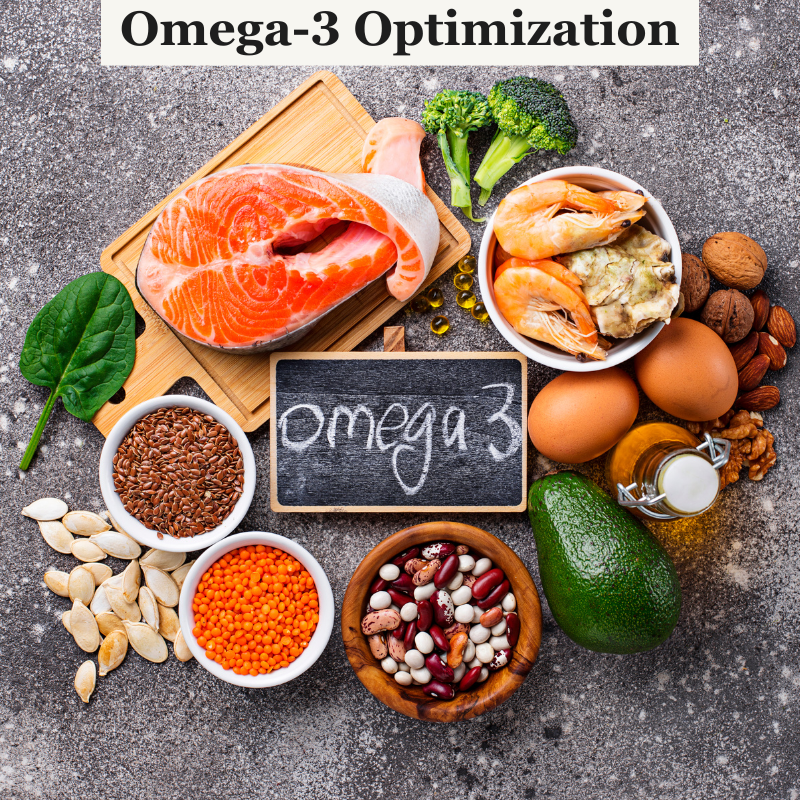Optimize your Omega-3 intake

The cells are not just the building blocks for health, but the representation of an intricate design of perfectly working machinery to form a whole and functional system for our bodies. Omega-3 fats maintain robust cell integrity. A vital fatty acid is necessary for our well-being.
Key points
- Why omega-3s are more important than other healthy fats
- How it improves brain, heart and longer lifespan
- How much omega-3s does one need per day
- The evidence shown by research
- Who benefits the most
Your brain is 60% fat by weight. Brain power, speed and memory rely heavily on healthy fats for thinking and processing. To make the hormones responsible for reproduction, metabolism, and growth, we need healthy fats. Lack of this one essential nutrient can cause complex complications.
Back in the day, fats got a bad name because some experts and studies made people think they were bad. People used to think it was bad for your heart, but now we know it's actually good for you.
The newsletter focus today is on omega-3 fatty acids because this one fat the body is incapable of making. It’s what we call an essential fatty acid. Its significance is further emphasized by its potential to extinguish the smoldering flames of chronic inflammation. It also plays a beneficial role in immune defense and microbiome health. Probably what sets omega-3s apart from the other fats.
Now that we understand the importance, we probably assume everyone eats enough omega-3s. Not really. 65-95% of the US population consumes less than recommended. Not by a small amount. We are talking about underestimating the daily intake by 80%.
Common problems which may manifest because of deficiency:
Memory issues, mood disorders and poor focus
Muscle soreness, joint stiffness, and pain
Weight gain and metabolic issues
Mental fatigue and low energy
Here is some evidence to show the potential benefits
The GISSI-Prevenzione Trial
Key Finding: Omega-3 supplementation reduced cardiovascular death by 30% and sudden cardiac death by 45% in post-myocardial infarction patients.
Significance: Established omega-3s as a protective factor for heart disease patients.
The MIDAS Study (Memory Improvement with DHA Study)
- Published: Alzheimer's & Dementia (2010)
- Key Finding: Daily supplementation with DHA (900 mg) improved memory and learning in older adults with mild cognitive impairment.
- Significance: Demonstrated DHA’s role in supporting cognitive function and protecting against neurodegenerative decline.
Meta-Analysis on Omega-3 and Mortality
- Published: Circulation (2017)
- Key Finding: Omega-3 supplementation reduced the risk of death from any cause by 7%.
- Significance: Highlighted omega-3s as a simple intervention to improve overall lifespan.
The longevity, brain and heart benefits seem to be dose dependent. This suggests that a higher dose than the recommended one is needed. Marine sources are likely the best option because they are easily absorbed and used by the body. While you can use vegetarian sources, their low absorption requires a much higher intake.
The amount of omega-3s and details for each source:
| Marine Sources | Omega-3 Content (per 100 g or serving) | Bioavailability (Absorption) |
|---|---|---|
| Salmon (Wild) | ~1.8 g EPA + DHA | High: Easily absorbed (~95%) |
| Sardine | ~1.5 g EPA + DHA | High: Easily absorbed (~95%) |
| Mackerel | ~2.5 g EPA + DHA | High: Easily absorbed (~95%) |
| Cod Liver Oil (1 tbsp) | ~2.7 g EPA + DHA | High: Liquid form ensures easy absorption |
| Oysters (6 medium) | ~0.5 g EPA + DHA | High: Easily absorbed (~95%) |
| Anchovies | ~2.1 g EPA + DHA | High: Easily absorbed (~95%) |
| Salmon Eggs (Fish Roe) | ~1.1 g EPA + DHA (per tbsp) | High: Easily absorbed (~95%) |
| Vegetarian Sources | Omega-3 Content (per 100 g or serving) | Bioavailability (Absorption) |
|---|---|---|
| Flax Seeds (1 tbsp) | ~2.3 g ALA (must be ground for digestion) | Low: ~5-15% converted to EPA/DHA |
| Chia Seeds (1 oz) | ~5 g ALA | Low: ~5-15% converted to EPA/DHA |
| Hemp Seeds (1 tbsp) | ~1 g ALA | Low: ~5-15% converted to EPA/DHA |
| Walnuts (1 oz) | ~2.5 g ALA | Low: ~5-15% converted to EPA/DHA |
For maximum absorption and benefits, prioritize marine sources or consider supplementation with fish oil or algal oil for direct EPA and DHA.
Experts recommend 1g of omega-3s per day, but I believe that a higher range of 2-3g per day would be ideal.
Who benefits the most?
Individuals with heart disease: Omega-3s lower blood pressure, triglycerides and prevent arrhythmias.
Pregnant and breast-feeding women: Critical for brain and eye development in babies.
People who have mental health conditions: Known to improve depression, anxiety and bipolar disorder.
Chronic inflammation: Omega-3s are ideal for improving symptoms of arthritis and inflammatory bowel disease.
Older adults: Leads to reduced cognitive decline and dementia
Summary
Longevity and antiaging benefits abound. Your biological age is far more important than your chronological age. We see it all the time. People who look (biological) younger than their stated age (chronological). Omega-3s work together in various ways to rejuvenate us. To optimize omega-3 intake, prioritize fatty fish or consider supplementation if dietary sources are inadequate. Healthy fats are cool, but omega-3 fatty acids are coolest. Let's nourish our mind and heart so we can strengthen the steps needed to live healthier and longer lives.